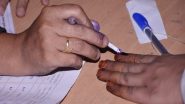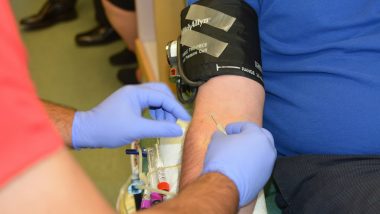New Delhi, February 6: The death toll due to swine flu in Delhi has risen to six, even as 74 fresh cases of the HINI virus were recorded here on Wednesday, taking the total number of people affected by the disease in the city this year to 1,093, according to a report of the Directorate General of Health Services. The report also mentioned deaths of five more persons from co-morbidity, who had H1N1 infection.
As per the report, of the six persons who have died of swine flu this year, one belonged to Delhi, while the rest five were residents of other cities, the report said. Amid the mounting cases of the H1N1 infections in the city, the Delhi government Wednesday issued a health advisory, prescribing the dos and don'ts. Swine Flu Case on Rise in Rajasthan: 210 Deaths Reported From State, Jaipur Worst Affected City.
"Patients with co-morbid condition like low immunity, on immune-suppressant, blood cancer, renal transplant, diabetes, heart disease are at high risk of getting infected with swine flu," the advisory said. After the 74 fresh cases of H1N1 virus were recorded on Wednesday, the total number of people affected by the flu in Delhi this year reached to 1,093.
The cases included 868 adults and 225 children, the DGHS report said. Till Monday, the Delhi government had not reported any death due to the flu, but it recorded one death of a Delhi resident on Tuesday, the report said,
However, two Centre-run hospitals here have reported 13 deaths due to swine flu this year. According to senior officials at Safdarjung Hospital, three deaths due to swine flu have been recorded this season, while RML Hospital has reported 10 fatalities.
Nine of the 10 people who died at RML Hospital were from Delhi, and the other one was from outside the city, officials said. Seasonal Influenza (H1N1) is a self-limiting viral, air-borne disease spread from person-to-person, through large droplets generated through coughing and sneezing, indirect contact by touching a contaminated object or surface (fomite transmission like telephone, cell phones, computers, door handles, door bells, pens, toys etc) and close contact (including hand shaking, hugging, kissing), the advisory said.
The symptoms are fever, cough, sore throat, runny or stuffy nose, difficulty in breathing. Other symptoms may include body ache, headache, fatigue, chills, diarrhoea and vomiting and blood-stained sputum. There are three categories of H1N1 influenza -- A, B and C. "No Oseltamivir (medicine) and testing is required for category A patients. They should confine themselves at home and avoid mixing up with public and high risk members in the family," the advisory said.
In addition to all the signs and symptoms mentioned under category A, if a patient has high-grade fever and severe sore throat, he or she may require home isolation and Oseltamivir. In addition to all the signs and symptoms mentioned under category A, individuals having one or more of the high-risk conditions shall be treated with Oseltamivir, it added.
High-risk group includes, children with mild illness but with predisposing risk factors, pregnant women, persons aged 65 years or older, patients with lung diseases, heart disease, liver disease, kidney disease, blood disorders, diabetes, neurological disorders, cancer and HIV/AIDS, or those on long-term cortisone therapy, the advisory said. In addition to the signs and symptoms of categories A and B, if the patient has one or more danger signs, like breathlessness, chest pain, drowsiness, fall in blood pressure, sputum mixed with blood, bluish discolouration of nails, then these patients (under category C) require testing, immediate hospitalisation and treatment, it added.
After holding a state-level review meeting on In?uenza A (H1N1), the Delhi government recently said that all government hospitals in the city are equipped with necessary logistics required for the management of the disease and drug Oseltamivir along with personal protective equipment (PPE kits) and N95 masks are also available.
The advisory also asked people to avoid crowded places in the swine flu season and stay more than an arm's length distance away from persons sick with flu. It also asked to avoid excessive physical exercise, disposal of used napkin or tissue paper in open areas, touching surfaces usually used by public (railing, door gates, etc, smoking in public places and unnecessary testing.
"All hospitals have been asked to keep ventilators ready, and also told to disseminate information on the prevention of the disease," the Delhi health department official said.
Health advisories in English and Hindi on seasonal Influenza A H1N1 (swine flu) have been prepared and issued for general public in leading newspapers. For any query on swine flu, people can seek assistance on the 24X7 helpline number at DGHS (HQ): 011-22300012, 22307145.













 Quickly
Quickly





















